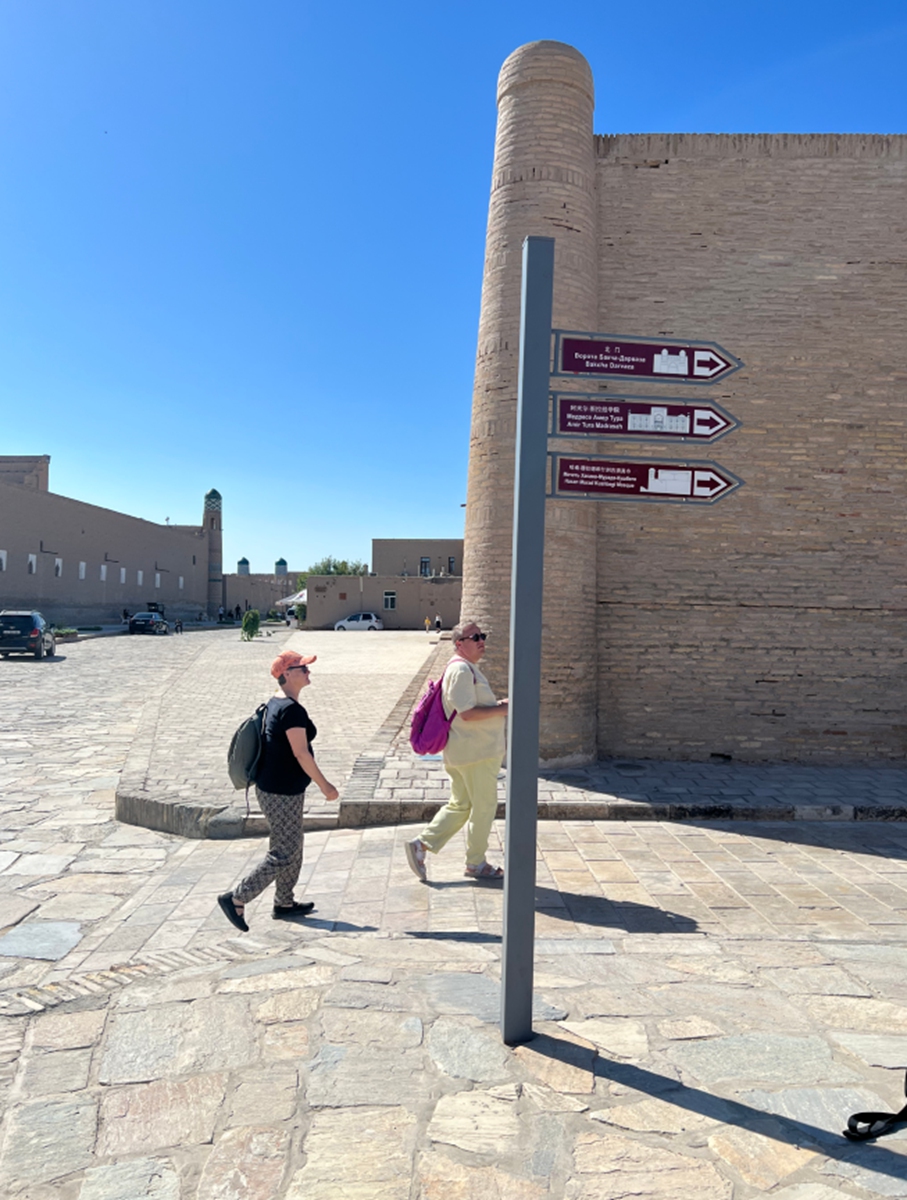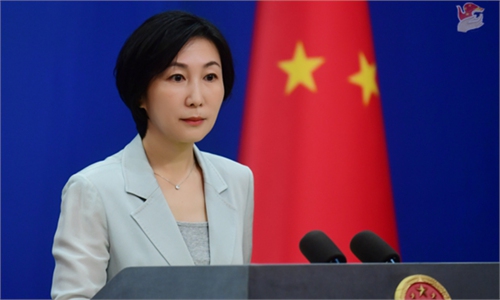ARTS / CULTURE & LEISURE
In Uzbekistan, ancient 'silk bond' adds new impetus for cooperation with China
Cultural heritage minister hails ‘brotherly relationship’

Visitors walk past a road sign that includes Chinese characters in the ancient city of Khiva, Uzbekistan on September 5, 2023. China assisted in the restoration of the Amir Tura Madrasah. Photo: Wang Cong/GT
Ask anyone in Uzbekistan about the biggest advantage of the country's culture and tourism development, the response is usually three words - history, culture and safety - usually in that order. In history, Uzbekistan was a crucial hub on the ancient Silk Road linking China with the West for exchanges that included not just goods but also culture. Through such deep historical roots, a longstanding bond formed between China and Uzbekistan.
"Our official diplomatic relations started over 30 years ago, but in my view, we have maintained close ties for more than 2,000 years," Aziz Abduhakimov, Uzbekistan's minister of cultural heritage, said in a recent interview.
"Our relationship is very close, and it's a brotherly relationship."
Today, as the central Asian country of roughly 35 million people aims to boost its social and economic development under President Shavkat Mirziyoyev's "New Uzbekistan" vision, such a "silk bond" offers new impetus for cooperation with China - not just economically but also in terms of culture and tourism.
In many cities across Uzbekistan, officials and local residents do not hold back their pride in their country's historical and cultural bonds with China. They often refer to the ancient Silk Road as "the Great Silk Road" and the relationship between Chinese and Uzbek people as "brothers."
And they have plenty of anecdotes to offer. In the historical city of Bukhara, a local official said that a popular local noodle soup known as Lagman in fact originated from China. In the southern border city of Termez, a local resident held his hands together and waved them up and down, while repeatedly saying the Uzbek words: "Uzbek and Chinese." In the city of Khiva, a resident living just meters away from the Amir Tura Madrasah, which China assisted in restoring, tried to invite Chinese reporters to his house for tea through a mobile translator app.
"The relations between our two countries have a deep history… it began over 2,000 years ago," Vladimir Norov, former secretary general of the Shanghai Cooperation Organisation and former foreign minister of Uzbekistan, told the Global Times in an interview, stressing that with such deep ties come great opportunities for the two countries to cooperate on a wide range of areas, including culture and tourism. "Tourism for Chinese tourists in Uzbekistan is untapped, and the same goes for Uzbeks in China."
Uzbek officials said that while the number of Chinese arrivals in Uzbekistan has been relatively small in recent years due to factors such as the COVID-19 pandemic and other inconveniences, but that is about to change thanks to an emphasis on culture and tourism cooperation at the national level and concrete measures taken by the Uzbek side to welcome more Chinese tourists.
In May, on the sidelines of the first China-Central Asia Summit in Xi'an, Northwest China's Shaanxi Province, China and Uzbekistan issued a joint statement, in which, among other things, the two sides vowed to further expand cooperation in the fields of culture, education, science, sports, tourism and archaeology.
"My hope is that we have more and more Chinese tourists come to Uzbekistan," Abduhakimov said, stressing that Uzbekistan is making great efforts in attracting more Chinese tourists. He said that Uzbekistan is considering further extending the period of the application free visa for Chinese tourists, adding Chinese to road signs, training more Chinese-speaking guides and increasing more flights.
"All these show the great importance we attach to Chinese tourists," he said.
Still, the most unique experience Uzbekistan will offer to Chinese tourists will be the memories of the deep historical bonds between the two countries that date back to more than 2,000 years ago.
"When Chinese tourists come here, they will learn where and how trade along the Great Silk Road happened in Bukhara," a local tourism official in Bukhara said as he showed the Global Times the old city, where caravanserais for the ancient Silk Road have become local handicraft shops.
"Bukhara was at the center of the Great Silk Road, that's how people know [Bukhara]," Radjabov Akmal, head of section in Bukhara tourism department, told the Global Times.
To further boost Uzbekistan's attractiveness as a top destination for Chinese tourists to experience the ancient Silk Road, the country also plans to develop special travel routes retracing the Silk Road and restore caravanserais, according to Abduhakimov.
That could be very popular among Chinese tourists, as many are increasingly interested in learning about the ancient Silk Road, thanks to the success of the Belt and Road Initiative (BRI) over the past decade.
In Samarkand, a Chinese tourist surnamed Feng from Southwest China's Sichuan Province said that retracing the ancient Silk Road has become a passion for her and fellow retirees.
"We are actually planning to visit 30 countries that are participating in the BRI," Feng told the Global Times.




